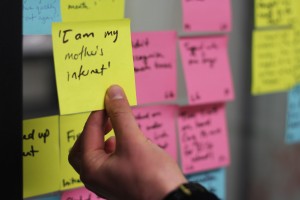
User quote from research session
Last year we had our first discovery phase, where we looked into whether Govt.nz can help older people find out about and use the government services they’re entitled to. This group are notoriously difficult to get online, so we went in with our eyes open to the possibility that Govt.nz might not be much use for them. But by targeting family members and expert intermediaries as well as older people themselves, and creating clear, concise content that’s easy to read, we’re confident that we can reach this audience.
Older people struggle interacting with government online
Our friends in the Older People cross-agency working group have identified that older people, particularly those who are vulnerable and isolated, are struggling to find information about government services online. Information about a single service is often spread out across multiple government websites that aren’t joined up, meaning that people can’t get what they need. Even if people manage to get to the right agency site they find the information overwhelming and difficult to understand. One (very well educated) user research participant gave up on applying for a community services card, saying she felt like the difficulty of the process was deliberate.
Discovery phase to determine whether Govt.nz can help
A discovery phase is an agile method used to determine whether a new digital initiative is a good idea. It involves a small team of people getting to grips with the business needs for a change or new product, conducting user research to find out what people need, and looking at how people find information and access services in the existing landscape. Once we gathered enough insight, we came up with different content and design approaches and tested these out with users.
User research
We conducted lots of user research to find out whether we could help this audience, including going to a SeniorNet computer training session, asking people to use our content at the Wellington Central Library, a focus group at Home Café in the National Library, and informal interviews. We talked to experts and intermediaries at SeniorLine, Ministry of Social Development (MSD) Senior Services Contact Centre, Office for Senior Citizens, Age Concern, and Citizens Advice Bureau to get their insights on common user problems in this space. We also conducted usability testing on prototypes and test content to try out whether our ideas worked for people.
The key behavioural insights from user research are:
- older people don’t act until they have to, and part of coping with old age is denial
- older people are missing out on services they’re not aware of, and a big hurdle is not knowing what services are called
- intermediaries empower older people when dealing with government systems, especially determining eligibility for services which can often seem inconsistently administered and intrusive — and intermediaries often rely on Google to find the information.
Common older user concerns included:
- applying for NZ super and foreign pensions
- hidden costs of rest homes and retirement villages
- housing issues such as down-sizing, renting and heating
- deteriorating health and death of a spouse
- working out eligibility for government services.
Ways that Govt.nz can help
From all of this insight we worked out that Govt.nz can really help the older audience get the government services they’re entitled to by:
- targeting both older people and the people who help them access government services like expert intermediaries and family
- covering the end-to-end user journeys we believe that we can improve significantly — where there’s good existing stand-alone content we’ll link to it and not recreate the wheel
- creating a new entitlement template that we can use to structure service eligibility information in a clear, succinct way that will give people all the information they need in one place
- making sure that we lead people to services they might not know about, for example when people visit the Govt.nz Rates Rebate scheme page, we can also present them with other financial support such as the Accommodation Supplement.
MSD was very happy with our approach, and we’ve managed to secure Better Public Services Seed Funding from Result 10 to continue to the next phase of the project. We’re working to get past the obvious barriers to getting information to this group online by creating simple, consolidated user journeys that can also be used by intermediaries and family. It’s a big step towards consolidating government information around customer needs as stated in the Government ICT Strategy and the Result 10 Blueprint, and we’re lining up success measurements so we can show that this work improves NZers’ experience with government.
Get a copy of the report
To get a copy of the Older People Discovery Phase report please email Govt.nz@dia.govt.nz.
It's a beautiful report, and well worth a read for anyone interested in the needs that older people have from digital government and agile digital practices.


